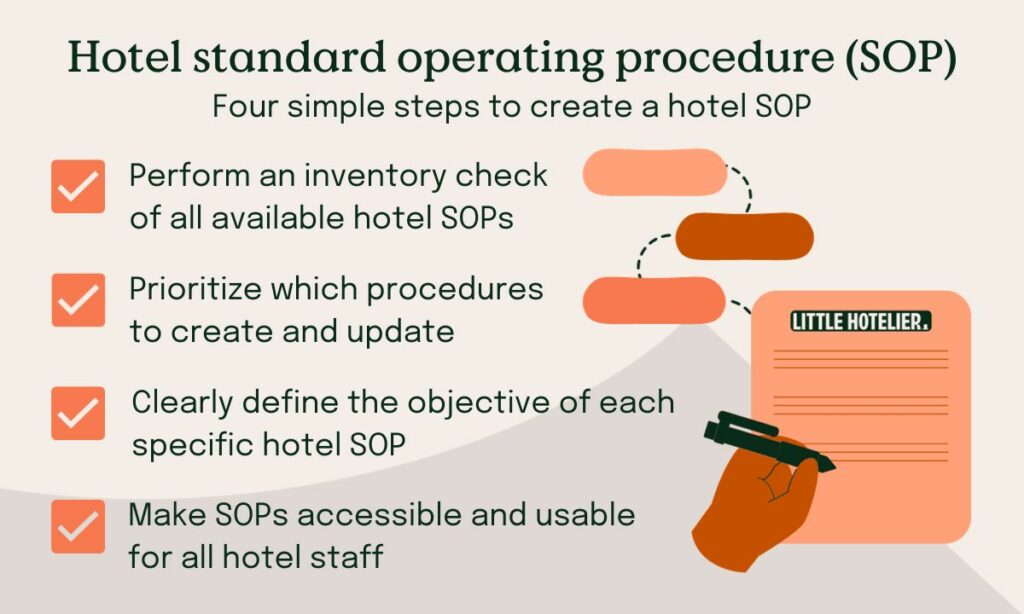To run a successful property a hotelier must ensure that they maintain the highest quality and safety standards possible. But how? The answer is in standard operating procedures (SOPs).
Hotel SOPs form a playbook for running your property in a way that will keep guests safe and happy. They cover any and every aspect of your property: front desk operations, room cleaning, emergency drills and more.
In this blog we will explore all that a small, independent hotelier should know about SOPs: what they are, why they’re important and how to implement them.
Less guesswork, more confidence
Implementing standard operating procedures at your small hotel can be tricky, but you can easily streamline SOPs with the help of Little Hotelier.
Learn moreWhat are hotel standard operating procedures (SOPs)?
An SOP is a set of clear instructions that outline how to complete a specific task. SOPs can take a variety of forms that tend to be driven by the process they describe: a simple bullet-pointed list, a word-by-word script, or a detailed manual complete with pictures. The best SOPs are those that offer both detail and freedom, as this grants workers the flexibility they need to excel in their roles.
SOPs can (and should) be created for all hotel staff: front office, sales and marketing, customer service, food and beverage operations, housekeeping, maintenance, accounts and more. They should cover scenarios as common as room cleaning and as uncommon as emergency situations.
It’s not enough to simply develop an SOP. Perhaps the most critical step is in its implementation: conducting training to ensure all staff understand it and follow it.
Why are hotel SOPs important?
When you consider the wealth of tasks undertaken at your hotel the importance of SOPs becomes clear.
Think of when you last brought on a new employee and the number of jobs that they needed to learn, from those that are undertaken multiple times a day to those that may only come up once every few months. Documenting the best ways to do each of these tasks ensures that new team members can be quickly onboarded, and that they work efficiently and effectively from day one.
- Some SOPs are required by law, such as food safety procedures and emergency fire drills. If you fail to comply with regulations your business can face serious consequences, from a fine to a criminal prosecution.
- Some SOPs simply keep your hotel running, such as paying bills and conducting routine maintenance. If you want to avoid driving your hotel into the ground, these tasks need to be done consistently and correctly.
- Others still are designed to separate your hotel from its competitors. These SOPs aren’t a box to be ticked or chore to be done – they’re a superpower. They can help you to enhance your service and create truly unique and truly memorable experiences – the sort that will have guests spreading the word and coming back for more.
Hotel standard operating procedures are also important because hotels are really 24/7 operations, and owners and managers won’t always be on-site or easily contactable. Well crafted SOPs give all team members the tools they need to tackle any situation that might arise.

What are the 3 steps to make a hotel SOP?
Now that we know what hotel SOPs are and why you need them, let’s look at how to create one. The good news: it can be as simple as one, two, three.
1. Do an SOP stocktake
Which procedures at your hotel don’t currently have an SOP that need one? Which procedures have an SOP that could be updated or improved? Are there any SOPs that unnecessarily restrict your team, where removing the safety rails could allow them to create an even better, more personalised guest experience?
Grab any SOP documentation that you might currently have, then get together with your team to answer these questions. Many hotel procedures become muscle memory over time, so a fresh set of eyes can be hugely beneficial during an SOP stocktake, whether from a new team member or a member of another department.
Prioritise the SOPs you need to create and update by importance and impact. If an SOP keeps your guests safe and your hotel running, it should be at the top of the list. Once those are knocked over you can begin to work on the SOPs that will separate your hotel from the rest by delivering incredible experiences.
2. Define your objective
No matter whether you’re creating or updating an SOP, you should start with the same question: what is the end goal? To successfully check someone in? To clean a room perfectly within a certain amount of time? To ensure all guests are safe and accounted for?
Defining the ultimate goal of a particular SOP allows you to move methodically back to the start, marking the steps to success along the way. You can also compare each of your steps to the objective, helping you to identify any that are missing or unnecessary.
An example: You want to improve your SOP for responding to discount requests. In doing so you ask your team how they currently respond. One worker says they have found success in asking guests whether they are part of your loyalty program, which offers a consistent discount to members. You realise that this is the best approach, so amend your SOP accordingly.
This approach also ensures you share the ‘why’ behind SOP changes with your team, making them far more open to the idea of doing things differently.
Take precious time back in your busy day
See how you can easily manage hotel operations, deliver a good guest experience, and attract more guests.
Watch a quick demo3. Make your SOP usable and accessible
Once you’ve developed your SOPs it’s wise to do a few dry runs. These can identify any errors or oversights and ensure your SOP meets the goal set out at the beginning.
Ensure that your SOPs demand input from your staff – something as simple as checking a box – as this helps to set the right habits at the beginning, and gives you a record of compliance that you can look back on if issues arise.
Make your SOPs easily accessible. Place hard copies in your office filing cabinet and digital copies in your computer system, and consider putting the most common/important, such as check-in and phone SOPs, up on the walls of your workspace.
Top tips for implementing and maintaining SOPs at your hotel
Your hotel is different to other hotels, so your SOPs will be different to other SOPs. Nevertheless there are a few universal tips that ensure the implementation and maintenance of your SOPs is a success:
- Train to empower: SOPs form the playbook for dealing with situations that occur on your premises, but ensure there is wriggle room where appropriate. Your SOP training should make your staff feel entrusted and empowered.
- Short and punchy: Deliver instructions as efficiently as possible while still going into the necessary detail. Visuals like photos and flow charts can help.
- Review and refresh: Your SOPs are never ‘complete’. Establish a regular review schedule, such as every three months, and update your SOPs where required.
By Dean Elphick
Dean is the Senior Content Marketing Specialist of Little Hotelier, the all-in-one software solution purpose-built to make the lives of small accommodation providers easier. Dean has made writing and creating content his passion for the entirety of his professional life, which includes more than six years at Little Hotelier. Through content, Dean aims to provide education, inspiration, assistance, and, ultimately, value for small accommodation businesses looking to improve the way they run their operations (and live their life).
Table of contents
“I'm in love with the new app because it's very simple to use! I had to rely on someone calling me, but now it's as simple as using the desktop software.”
Owner, Athelstane House









Saban Demirbasa,
Head of Hospitality and Branding
Stone Court House